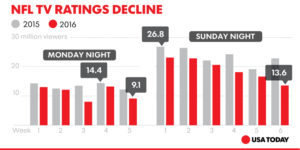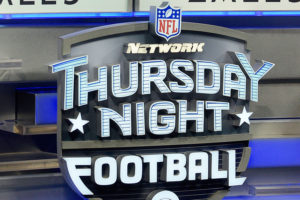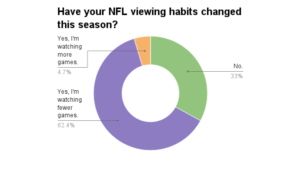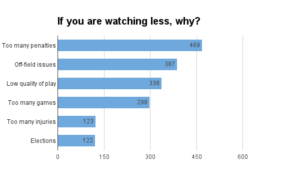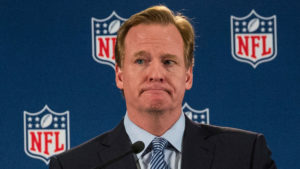For decades, the National Football League (NFL) has dominated not only professional sports television, but the entire field of network programming. During the 2015 season, the NFL owned all of the top 25 programs on television after years of climbing ratings and brought in $15 billion in revenue (The Ringer). However, the 2016 season has been a different story. Through Week Six, overall NFL ratings were down 11%, causing the national media to question if the NFL was beginning a permanent decline. Ratings have slightly rebounded, but the NFL has been exposed as a vulnerable property, something that was once unthinkable. The decline in NFL ratings can be attributed to a combination of competition from other entertainment sources, oversaturation of games and a lower quality product, issues it will have to resolve to stay relevant.
2016 has been a rough year for the NFL because it has faced unprecedented competition for viewers from the historic presidential election and Major League Baseball (MLB) playoffs. NFL ratings have declined in the past due to the presidential election, with declines of -10% in 2000 and -2% in 2008 (Washington Post). However, declines were as high as -15% during the 2016 election (Washington Post). This can possibly be written off as a product of the media circus surrounding this election, but is nonetheless the highest decrease in recent history. After the election, games did slightly rebound, with the Cowboys-Steelers prime time game finishing +2% and the Patriots-Seahawks prime time game finishing +16% (Forbes). Still, the regional games on Fox finished -19% while the CBS regional games were down -7% (Forbes). The election is likely partially responsible for the decline in overall ratings, but is not the sole culprit.
Perhaps more concerning was the success of the MLB against the NFL. While football ratings languished, baseball ratings skyrocketed. This culminated in the October 30th Chicago Cubs-Cleveland Indians World Series matchup having more viewers than the Dallas Cowboys-Philadelphia Eagles Sunday Night broadcast. This is only the third time the MLB beat the NFL since they began going head-to-head in 2010 (USA Today). The World Series even drew 40.045 million viewers for the final game, more viewers than any NFL game since Super Bowl 50 (Rum Bunter). Like the election, this unlikely success for baseball might be due to the exciting narrative of the Cubs snapping their 108 year drought against the similarly long-suffering Indians. Ultimately, baseball beat football for the first time in the 2010’s and the NFL proved it was not matchup-proof.
Another simple economic explanation for the NFL is the supply for the product has increased, causing demand to decrease. For much of its history, NFL games were on Sunday afternoons with one Sunday night game and one Monday night game. Now, the NFL airs 15 games per season on Thursday nights along with the Sunday and Monday night games, which are sometimes doubleheaders (The Ringer). The NFL has also added 9:30 a.m. EST games in London to build an international audience (The Ringer). There are also multi-game packages geared towards fantasy football players such as DIRECTV Sunday Ticket and streaming options on WatchESPN and Twitter. Others simply follow games at bars or via scoring or fantasy apps on their phone.
The NFL has created a problem for itself by making its product too widely available. By increasing its supply of games, it is making it harder for viewers to devote time to games. Viewers used to be able to watch their team’s Sunday afternoon game interspersed with highlights from other games, leaving time to watch the prime time matchups. Committing to a Thursday night game, three Sunday games and a Monday night game is a lot of time for a person to spend watching television. It doesn’t help that games run for three hours, much of which is advertising. Encouraging people to spend more time watching football does not reflect trends in television viewership. Since 2010, the time Americans spend watching TV has dropped 11 percent (Washington Post). For social media-obsessed people under 24, TV time has plunged more than 40 percent (Washington Post). As commercial-free streaming options such as Netflix and HBOGo continue to grow, less people will want to watch three hours of ad-heavy football. Time is scarce, and people are choosing to spend less of their time watching television. The NFL is fighting this trend by making their product less of an event and demand is decreasing as a result.
The oversaturation issue is further amplified by the concern that the quality of product the NFL is pushing has declined. Thursday night games are frequently criticized as less entertaining than Sunday and Monday games. Teams have only four days to create a game plan and recover from injuries, resulting in sloppy games that often end in blowouts. The average margin of victory for 2016 Thursday night games is over two touchdowns while the Vegas underdog team has only won twice (Sports Illustrated). This is not just a Thursday night issue, competition is down overall. Through Week 12, Vegas underdogs have only won 39% of the time (Sports Illustrated).
Not only are games more predictable, there is a growing concern that officials are making them more unwatchable through excessive penalties and fines. Many of these penalties have been unsportsmanlike conduct flags thrown for rather innocent touchdown celebrations by superstars such as Antonio Brown and Odell Beckham Jr. Viewers have taken notice, including Monday Night Football announcer Sean McDonough:
“If we’re looking for reasons why TV ratings for the NFL are down all over the place, this doesn’t help. The way this game has been officiated is not something anybody wants to watch.” (The Ringer)
While individual games struggle, larger NFL narratives that drove the league’s entertainment value for years are also disappearing. For much of the last ten years, the central battle in the NFL has been between its two top quarterbacks: Peyton Manning and Tom Brady. Manning is now retired, while Brady was suspended for the first four games of 2016 and is likely a few years from retirement. Other star players such as Marshawn Lynch and Calvin Johnson have retired over fear of lasting injury from football. There is no Cubs-Indians narrative to excite fans in sight for the NFL. It is difficult to draw people to prime time games without marketable stars.
The NFL’s suspension policy has also been a major public relations issue for the league. The league has faced criticism for giving players found guilty of domestic violence light suspensions, such as Ray Rice (two games) and Josh Brown (one game). Meanwhile, Tom Brady got four games for possibly helping deflate footballs and star running back Le’Veon Bell got three games for skipping a marijuana test. This failure to punish criminal issues while using a heavy hand on comparatively trivial ones is a huge point of contention for many fans, especially women. The league’s handling of players protesting social issues by refusing to stand for the national anthem, led by former starting 49’ers quarterback Colin Kaepernick, has also alienated some fans. According to an October Rasmussen Poll, 32% of respondents said they were less likely to watch a game because of Kaepernick (Sports Illustrated). The NFL has not done a good job of consistently disciplining its players for issues fans deem important, making its stars less marketable.
The NFL needs to take multiple steps to address its slumping viewership. League executives should begin by firing Commissioner Roger Goodell. While Goodell has overseen successful years and has gone on record saying he wants to grow the league to $25 billion in revenue by 2027, he has made many poor decisions (The Ringer). Goodell oversaw the expansion of the unpopular Thursday night games and has failed to address the domestic violence and concussion issues while encouraging punishments for touchdown dances. He inherited a wildly successful organization and has not been able to effectively grow it or tackle controversies. Like when a corporation suffers a scandal and fires its CEO, a change in leadership would show the public that the NFL has heard its criticism and is willing to head in a new direction.
That new direction should tackle two of the largest issues that the NFL faces and has control over: decreased quality of play and oversaturation. The NFL should begin with eliminating Thursday night games. This will attract more viewers to Sunday games as all but two teams will be playing on one day. Placing most games on Sunday will also make it easier to show marquee matchups in prime time. Almost every team would plan on playing the same day and there would be more daytime slots available to help tweak the schedule in favor of a good Sunday night game. The NFL can combine this with looser rules on penalties, allowing fans to watch a more uninterrupted, clean product. This will help make football what it is meant to be: an entertaining experience. Cleveland Browns left tackle Joe Thomas summarized the best approach for the NFL, saying, “I think [officials] would be wise to remember that the NFL is about entertaining — first and foremost — and they do not want to do things that take fun and excitement out of the game.” (Baltimore Sun)
The NFL can improve the viewer experience while avoiding an impending revenue crisis by focusing on streaming. Streaming services are quickly becoming the norm as more people stop buying expensive cable packages. The NFL’s consistent ratings dominance has been the reason cable companies stay relevant, but it is now beginning to show chinks in its armor. Major cable companies and carriers have committed a total of $50 billion to the NFL through the early 2020’s (The Atlantic). They are willing to spend such large amounts money on the NFL because advertisers are willing to pay top dollar ($5 million for a 2016 Super Bowl ad) for the large, consistent audiences the NFL promises (CNN Money). The NFL may soon lose these audiences if they do not adapt to the changing television landscape, causing advertisers to seek less expensive alternatives such as hockey, baseball and eSports.
When its cable contracts expire, the NFL should create a comprehensive streaming package, either separately or through an established provider such as Netflix. One of the bright spots in the NFL’s recent history is the creation of Sunday Ticket, a package that grants fans access to all NFL games. The well-received package is perfect for fans who want to see highlights from many games, such as fantasy football players, due to its RedZone component that constantly switches between highlights from current games. It also keeps fans who want to watch one game at once happy. This model could easily be adapted to a subscription streaming service and allow the NFL to consolidate its viewership by placing all games in one place rather than across multiple media outlets on multiple days. The NFL has already had success with the WatchESPN streaming app, which grew by 73% in 2015 (Washington Post). This would help the NFL become less reliant on ad revenue as fans are directly paying for the games, not a cable package that offers them.
The NFL is not going to start losing money any time soon, but has been notified by its fans thats it is not infallible. Television habits are changing, and the NFL is not immune, especially if it fails to address concerns about its product. The NFL must take steps to adapt to the changing television landscape before its revenue begins to fall as its ratings have.
Word Count: 1917
Works Cited:
http://www.si.com/nfl/photo/2016/10/20/nfl-television-ratings-decline-causes
http://www.si.com/nfl/2016/11/29/nfl-thursday-night-football-future-schedule-ratings
https://www.washingtonpost.com/business/economy/nfl-ratings-plunge-could-spell-doom-for-traditional-tv/2016/10/14/a7a23dc2-915f-11e6-9c85-ac42097b8cc0_story.html?utm_term=.6ec7aac0843e
http://www.theatlantic.com/business/archive/2016/10/nfl-ratings-just-fell-off-a-cliff-why/503666/
http://www.forbes.com/sites/maurybrown/2016/11/15/heres-the-real-reasons-why-nfl-tv-ratings-will-continue-downward/#12006b957f18
http://www.baltimoresun.com/sports/ravens/bs-sp-ravens-tv-1116-20161115-story.html
https://theringer.com/nfl-tv-ratings-crisis-81fd9dbd53a#.8k7mkxgvv
http://www.denverpost.com/2016/12/04/nfl-tv-ratings-down-denver-post-survey/
http://money.cnn.com/2016/11/11/media/nfl-ratings-roger-goodell/
The World Series beat Sunday night NFL in TV ratings and that doesn't actually mean much
